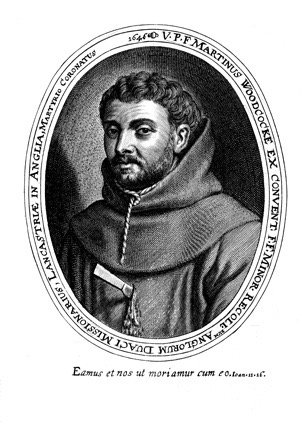Blessed John (Martin) Woodcock
Dates: 1603 – 1646
John Woodcock was born to a “Church Papist” Anglican father in 1603 at Woodcock Hall in Lancashire. [1] He was sent to Saint Omer to study with the Jesuits there and after finishing his humanities studies he was sent to Rome to complete his theological formation. There he no doubt met the Irish Franciscans who took over at the College of St. Isidore in the same year. He asked to enter the Capuchins but was dismissed from their novitiate after a few months, perhaps because of precarious health. He wandered around Europe aimlessly for three years until he arrived in Douai. There his desire to be a Franciscan was realised when he entered the novitiate of the Friars Minor in 1631. He was given the name Martin of St. Felix and made great progress both in his studies and in sanctity.
He was ordained a priest just four years later in 1635. He went to England on the mission but, after a few years, was forced to return on account of his ill health. His medics sent him to the baths at Spa to recuperate and he there met the Observant General Commissary. [2] He begged permission to return to England where Catholics were suffering renewed persecution in the Puritan-led Commonwealth. The Commissary gave him permission and John set out, landing in Newcastle in 1644. He went to his paternal home, but his father, fearful for the safety of his son, since many would have known that he had spent years abroad and studied for the priesthood, sent him away. The soldiers of the local garrison had, however, already been informed of his arrival and he was arrested immediately and imprisoned in Lancaster Castle, where he lived for two years. He was martyred on 7th August 1646, hanged at Lancaster Castle while he exhorted the crowd to understand why he had been condemned. [3]
John Woodcock was beatified along with 129 other martyrs of England and Wales on 22nd November 1987 by Pope John Paul II.
[1] The facts of John's life indicate his father was not truly conformed to the Church of England but was instead a “Church Papist”, that is one who conformed outwardly to Anglicanism in order to avoid the heavy taxes for recusancy, but retained his Catholic faith and supported his Catholic wife in raising their children as Catholics. Although this expediency was condemned by Church authorities it was a means by which many Catholic families accommodated themselves to the difficult situation of persecution in their homeland.
[2] The Order was divided administratively into two families, the Ultramontane family that comprised the provinces north of the Alps (ultra-montane means “beyond the mountains” when viewed from Rome) and the Cismontane family that included all the Italian provinces (cis-montane = “this side of the mountains”). When there was a Minister General from the Cismontane family, the Ultramontane family was governed by an Ultramontane General Commissary and it was to the holder of this post that John appealed.
[3] F. Bracci and A. Pozzebon. Frati Minori Santi e Beati. Rome: Postulazione Generale Ordine dei Frati Minori, 2009. p. 304-5.

Memorial Day: 12th July
